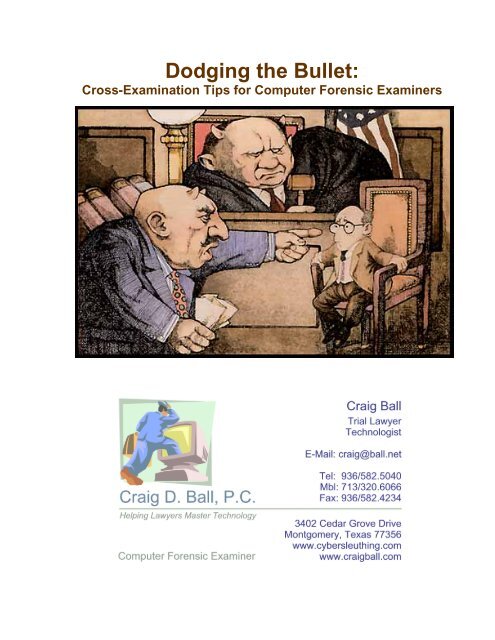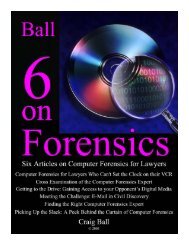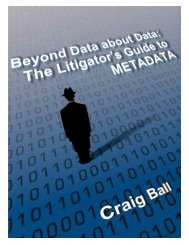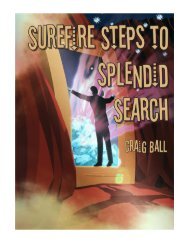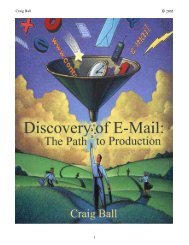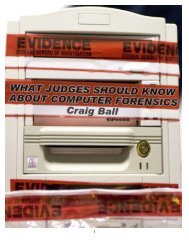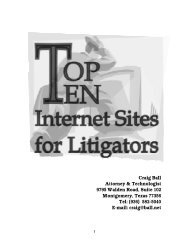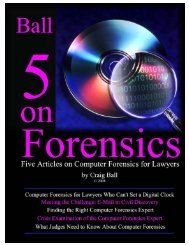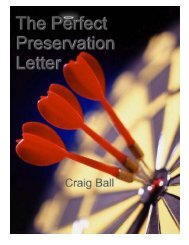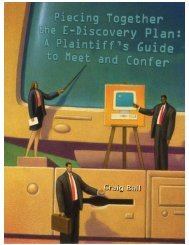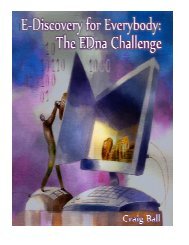The Ten Commandments of Cross-Examination for ... - Craig Ball
The Ten Commandments of Cross-Examination for ... - Craig Ball
The Ten Commandments of Cross-Examination for ... - Craig Ball
Create successful ePaper yourself
Turn your PDF publications into a flip-book with our unique Google optimized e-Paper software.
Dodging the Bullet:<br />
<strong>Cross</strong>-<strong>Examination</strong> Tips <strong>for</strong> Computer Forensic Examiners
Text © 2005 <strong>Craig</strong> <strong>Ball</strong> Dodging the Bullet<br />
Dodging the Bullet: <strong>Cross</strong>-<strong>Examination</strong> Tips <strong>for</strong> Computer Forensic Examiners<br />
What sets a <strong>for</strong>ensic examination apart from any other exploration and reporting <strong>of</strong> the contents<br />
<strong>of</strong> a computer system is the prospect <strong>of</strong> presenting those findings in court under oath. Every<br />
step we take as <strong>for</strong>ensic examiners, from acquisition to disposition, may someday need to be<br />
explained on direct examination and defended on cross-examination. <strong>Cross</strong>-examination…the<br />
part <strong>of</strong> the trial where the other side’s lawyer publicly attacks you, challenges your integrity and<br />
pounces on your every innocent slip <strong>of</strong> the tongue. In the movies and on television, just a few<br />
salvos <strong>of</strong> cross-examination invariably reveal the witness as a liar or a buffoon. No wonder<br />
cross-examination is the part <strong>of</strong> the trial that makes so many expert witnesses sweat!<br />
But not all expert witnesses flinch at the thought <strong>of</strong> cross-examination. For some, it’s the best<br />
part <strong>of</strong> the job--the ultimate thrill ride that tests their skills and af<strong>for</strong>ds them the opportunity to<br />
shine. <strong>The</strong>y understand that the jury reserves its closest attention <strong>for</strong> the cross-examination and<br />
that points made under fire leave the strongest impression.<br />
Jury persuasion can be based on trust, education or a mix <strong>of</strong> the two. If a juror comes to believe<br />
that an expert witness is trustworthy, i.e., skilled and credible, that juror is inclined to accept the<br />
witness’ opinions as fact on the strength <strong>of</strong> that trust. Alternatively, teach the jury the salient<br />
facts—instill knowledge in them--and the jurors will persuade themselves by the application <strong>of</strong><br />
that knowledge. Most <strong>of</strong>ten, effective expert witness persuasion entails a measure <strong>of</strong> both.<br />
As both trial lawyer and testifying computer <strong>for</strong>ensic examiner, I’ve cross-examined veteran<br />
witnesses and been cross-examined by skilled attorneys. From that unique perspective, I can<br />
attest that the qualities <strong>of</strong> an effective expert witness are preparation, knowledge, experience,<br />
effective communication, integrity and demeanor. You can be a more effective witness and<br />
manage your anxiety about cross-examination if you understand the lawyer’s agenda and<br />
prepare to meet the customary challenges. This paper explores those goals, describes<br />
common examination techniques and suggests strategies to come out on top.<br />
<strong>The</strong> Lawyer’s Goals in <strong>Cross</strong>-<strong>Examination</strong><br />
<strong>The</strong>re are just two reasons a lawyer cross examines a witness: to strengthen one side <strong>of</strong> the<br />
case or weaken the other. <strong>The</strong> lawyer who cross-examines to impress a client, show <strong>of</strong>f<br />
courtroom skills or hurt a witness who hasn’t hurt their case will usually regret the ef<strong>for</strong>t.<br />
Knowing what to expect in cross-examination comes from understanding the principal<br />
approaches used by attorneys in cross, to wit:<br />
<strong>The</strong> questioner may seek to bolster their side <strong>of</strong> the case by having you:<br />
a. Vouch <strong>for</strong> an opposing expert’s experience, integrity and qualifications;<br />
b. Confirm facts and findings favorable to the questioner’s theory <strong>of</strong> the case;<br />
c. Concede other outcomes are justified on different facts or viable alternative theories <strong>of</strong><br />
the case;<br />
d. Acknowledge flaws in other witnesses or theories on your side <strong>of</strong> the case; and,<br />
e. Identify texts or articles as authoritative.<br />
2
Text © 2005 <strong>Craig</strong> <strong>Ball</strong> Dodging the Bullet<br />
<strong>The</strong> questioner may seek to weaken your side <strong>of</strong> the case by showing you:<br />
a. Aren’t qualified to <strong>of</strong>fer the testimony;<br />
b. Missed something, used the wrong methodology or didn’t have all the relevant facts;<br />
c. Made prior statements inconsistent with your testimony;<br />
d. Offered opinions in conflict with conventional wisdom in the field; or,<br />
e. Are biased, prejudiced or otherwise not credible.<br />
Vouching <strong>for</strong> Opposing Experts<br />
For now, the ranks <strong>of</strong> knowledgeable, experienced computer <strong>for</strong>ensic examiners are small, and<br />
it’s not unusual to know the other side’s expert as an esteemed colleague or <strong>for</strong>mer instructor.<br />
So, what do you say when asked to agree that the other side’s expert is well-qualified or<br />
experienced? How do you reply when asked if the opposing expert enjoys a good reputation <strong>for</strong><br />
honesty and integrity? <strong>The</strong> answer is, just tell the truth. You don’t have to gush about how<br />
much you admire and revere them—save that <strong>for</strong> the testimonial dinner—but it’s fine to say, “I<br />
have a lot <strong>of</strong> respect <strong>for</strong> Jane Smith’s experience and abilities, and I think she would say the<br />
same about mine.” When facing <strong>of</strong>f against an opponent with a more impressive C.V., you<br />
could point out that computer <strong>for</strong>ensics is a relatively new discipline with emerging<br />
specializations, such that even though one practitioner has twenty years experience and<br />
another five, they may be equally experienced in the analysis <strong>of</strong> the NTFS file system. Further,<br />
computer <strong>for</strong>ensics is a specialized field, and simply because one has years <strong>of</strong> experience as a<br />
programmer, network administrator or police <strong>of</strong>ficer, they are not necessarily better qualified as<br />
a computer <strong>for</strong>ensic examiner.<br />
What do you do when you don’t hold the opposing expert in high regard or believe he or she<br />
isn’t qualified to <strong>of</strong>fer certain opinions? Here again, the answer is “just tell the truth,” but with a<br />
caveat: jurors <strong>of</strong>ten respond negatively to one colleague bad-mouthing another, so you may<br />
want to be reticent about specific concerns and leave them to counsel’s impeachment <strong>of</strong> the<br />
opposing expert. Jurors are well-attuned to damning with faint praise and will likely key in to<br />
your reluctance to praise the opposing expert.<br />
Confirming Favorable Facts and Findings<br />
Seasoned cross-examiners understand it’s the rare opposing expert who can’t do their case<br />
some good. It might be something as simple as confirming the presence <strong>of</strong> particular s<strong>of</strong>tware<br />
installations or viruses or acknowledging that a <strong>for</strong>ensic tool is widely accepted as reliable, but<br />
you’re almost certain to agree with some aspect <strong>of</strong> the other side’s case. Nervousness and<br />
suspicion may incline you to resist making any concessions, wondering if there might be some<br />
greater peril in the questions than appears on first blush. This is a win-win situation <strong>for</strong> the<br />
cross-examiner because you must choose between supporting parts <strong>of</strong> their case or appearing<br />
untrustworthy by refusing to concede undisputed facts. <strong>The</strong> correct approach is to simply<br />
answer truthfully without worrying about how your testimony affects the outcome. This puts the<br />
cross-examiner on the horns <strong>of</strong> a dilemma, <strong>for</strong> how aggressively can the examiner impeach you<br />
while still seeking to rely upon your concessions?<br />
Conceding Alternative <strong>The</strong>ories<br />
Every cross-examiner’s dream is that their questioning will be so skillful the expert on the stand<br />
will come around to supporting the questioner’s case. Though it sometimes occurs, it’s usually<br />
3
Text © 2005 <strong>Craig</strong> <strong>Ball</strong> Dodging the Bullet<br />
the result <strong>of</strong> poor planning on the part <strong>of</strong> the lawyer <strong>of</strong>fering the witness or poor preparation by<br />
the witness. But experienced counsel recognizes that you don’t need the opposing expert to<br />
switch sides to win. Often, it’s sufficient if the opposing expert simply concedes the viability <strong>of</strong><br />
alternative theories. Be prepared to explain not only why your interpretation <strong>of</strong> the evidence is<br />
the correct one but also why proposed alternative theories are wrong. For example, if the<br />
contention is that spyware or a virus caused contraband content to appear on a drive, you may<br />
have no choice but to agree that such malware exists and that it can be deployed in such a way<br />
as to unwittingly download illegal images. However, there are ways to guard against this tactic<br />
without appearing recalcitrant, <strong>for</strong> example:<br />
Attorney: You’d agree that there are programs like spyware and viruses that can infect a<br />
computer without the user’s knowledge?<br />
Witness: Yes, if the user takes no steps to guard against them.<br />
Attorney: Some <strong>of</strong> these programs can take control <strong>of</strong> a computer and cause it to do almost<br />
anything, right?<br />
Witness: Almost.<br />
Attorney: Including secretly downloading stuff from the Internet?<br />
Witness: I wouldn’t say “secretly,” but many users might be unaware <strong>of</strong> the activity.<br />
Attorney: Such a spyware or a virus could even download child pornography and a user<br />
might not be aware <strong>of</strong> it?<br />
Witness: That is not what occurred here, but it might otherwise be possible.<br />
Attorney: I didn’t ask you if that’s what occurred here. I asked you if it’s possible. Isn’t it true<br />
that it’s possible?<br />
Witness: Not if you are asking about the defendant’s computer, but perhaps on another<br />
system <strong>of</strong> another user.<br />
This example assumes that the witness has found evidence (e.g., gigabytes <strong>of</strong> carefully copied,<br />
moved and sorted contraband) which makes it clear that the virus and pop-up defense has no<br />
application. Though some would argue the attorney asked the “one-question-too-many,” the<br />
witness properly distinguished the scenario from the facts in the case at bar. A smart attorney<br />
won’t ask the obvious open-ended question (“Why isn’t that what occurred here”) because to do<br />
so would af<strong>for</strong>d the witness the opportunity to launch into an uncontrolled narrative. Instead, the<br />
attorney is <strong>for</strong>ced to either bully the witness to a concession everyone now understands is<br />
irrelevant or leave the unasked question floating about.<br />
Injecting qualifiers in this manner must be done sparingly and only when it’s clear that the<br />
concession sought strays dangerously far from the facts. If you become too enamored <strong>of</strong> this<br />
4
Text © 2005 <strong>Craig</strong> <strong>Ball</strong> Dodging the Bullet<br />
tactic, it can easily seem like you are incapable <strong>of</strong> answering straight questions with straight<br />
answers. Qualifiers should serve to alert the judge and jury that more explanation is needed<br />
and to signal your side’s counsel that these are matters to be addressed on re-direct<br />
examination.<br />
Acknowledging Flaws<br />
Of all the tactics used in cross-examination, my favorite had to be using one opposing expert to<br />
point up the errors <strong>of</strong> other opposing experts, underscoring flaws in my opponent’s case. I<br />
found that <strong>of</strong>ten, expert witnesses were so primed to find fault with my experts, they <strong>of</strong>ten failed<br />
to distinguish whose expert they were trashing. In final argument, it was effective to point out<br />
that even the other side’s own experts couldn’t agree on the facts.<br />
Your best defense here is simply to prepare sufficiently and be cognizant <strong>of</strong> what other experts<br />
have said in their reports and testimony. Bring such disagreements to your counsel’s attention<br />
so that ef<strong>for</strong>ts can be made to explore the differences and reconcile them be<strong>for</strong>e you take the<br />
stand. Also, weigh each question be<strong>for</strong>e you answer to gauge whether it really falls within your<br />
area <strong>of</strong> expertise. Jurors respect experts who recognize and acknowledge the limits <strong>of</strong> their<br />
expertise. If the opportunity arises, it may be possible to explain that although you and the other<br />
expert disagree on some minor details, you are firmly in agreement on the ultimate issues.<br />
Recognizing Authoritative Works<br />
Jurors place an outsize value on in<strong>for</strong>mation contained in<br />
published works, and the key to getting such contents<br />
admitted into evidence frequently hinges on the ability to<br />
prove the work is an authoritative text, <strong>of</strong>ten called a<br />
“learned treatise.” Where possible, opposing counsel<br />
wants that recognition <strong>of</strong> authority to come from an<br />
opposing expert. When that occurs, that expert or others<br />
can be impeached by the contents <strong>of</strong> the authoritative<br />
work, and passages can even be <strong>of</strong>fered as substantive<br />
evidence.<br />
If you’re thinking, “I just won’t recognize any publication<br />
as authoritative,” think again and consider the following<br />
scenario:<br />
Attorney: I’m handing you a copy <strong>of</strong> “Computer<br />
Forensics: Incident Response Essentials”<br />
by Warren Kruse and Jay Heiser. Do you<br />
own a copy <strong>of</strong> this book?<br />
Witness: I do.<br />
Attorney: Was this book one you read in connection with your own training in computer<br />
<strong>for</strong>ensics?<br />
5
Text © 2005 <strong>Craig</strong> <strong>Ball</strong> Dodging the Bullet<br />
Witness: It was.<br />
Attorney: Wouldn’t you agree with me that this book is regarded as a reliable authority in the<br />
field <strong>of</strong> computer <strong>for</strong>ensics?<br />
Witness: I don’t agree.<br />
Attorney: You don’t agree that this text used in your own training is a reliable authority?<br />
Witness: That’s correct.<br />
Attorney: I now hand you a copy <strong>of</strong> “High Technology Crime” by Kenneth Rosenblatt. This<br />
is another book I believe you read in connection with your pr<strong>of</strong>essional training?<br />
Witness: Yes.<br />
Attorney: So, you would agree that the Rosenblatt book is widely regarded as a reliable<br />
authority in the field <strong>of</strong> computer <strong>for</strong>ensics?<br />
Witness: No. It’s ten years old.<br />
Attorney: I see. [Bringing up large stack <strong>of</strong> books] Here are seven other reference works on<br />
computer <strong>for</strong>ensics [naming them <strong>for</strong> the record]. <strong>The</strong>se are books you’ve<br />
identified in prior testimony as those upon which you have turned to <strong>for</strong> answers in<br />
the past or read as part <strong>of</strong> your own pr<strong>of</strong>essional training. Do you recognize any<br />
<strong>of</strong> these published works as a reliable authority in the field <strong>of</strong> computer <strong>for</strong>ensics?<br />
Witness: I do not.<br />
Attorney: Is there any published work anywhere in any language that you do regard as a<br />
reliable authority in computer <strong>for</strong>ensics?<br />
Witness: I don’t know.<br />
Attorney: None?<br />
Witness: Not that I recall.<br />
Does this sound like a credible witness? Hardly! But, the perception might be different if the<br />
exchange had taken this turn:<br />
Attorney: Is there any published work anywhere in any language that you do regard as a<br />
reliable authority in computer <strong>for</strong>ensics?<br />
Witness: Counsel, I respect and admire many <strong>of</strong> the books on the table. <strong>The</strong> authors are<br />
my friends and colleagues. <strong>The</strong>y each have something valuable to say. But,<br />
6
Text © 2005 <strong>Craig</strong> <strong>Ball</strong> Dodging the Bullet<br />
computer <strong>for</strong>ensics is such a fast moving field that a book on the subject is out-<strong>of</strong>date<br />
by the time it’s published. To me, a reliable authority is one that can be<br />
trusted to be completely up-to-date and free <strong>of</strong> error. I’d expect that the authors<br />
themselves would agree that their books don’t pass that test.<br />
Attacks on your Qualifications<br />
Under Federal Rule <strong>of</strong> Evidence 702, in order to testify as an expert, a witness must be shown<br />
to be qualified “by knowledge, skill, experience, training, or education.” Clearly, this is a minimal<br />
threshold af<strong>for</strong>ding wide discretion to the court in terms <strong>of</strong> admission or exclusion. For scientific<br />
evidence, the traditional test <strong>for</strong> admissibility is called the Frye rule, which requires only that the<br />
evidence be based on scientific techniques generally accepted as reliable in the scientific<br />
community.<br />
Federal courts and several states have abandoned the Frye rule in favor <strong>of</strong> the Daubert<br />
standard, named <strong>for</strong> the U.S. Supreme Court decision in Daubert v. Merrell Dow<br />
Pharmaceuticals, Inc., 509 U.S. 579 (1993). Under Daubert, the party presenting an expert's<br />
testimony has the burden <strong>of</strong> showing that that testimony is both reliable and relevant. In<br />
accordance with Federal Rule <strong>of</strong> Evidence 104, the judge acts as a “gatekeeper” and decides<br />
threshold questions concerning an expert's qualifications and the admissibility <strong>of</strong> the evidence.<br />
Challenges to the qualifications <strong>of</strong> an expert witness are not usually dealt with be<strong>for</strong>e the jury<br />
but are addressed at a prior proceeding be<strong>for</strong>e the court called a “Daubert hearing.” In a<br />
Daubert hearing, the judge weighs several factors going to the “theory or technique” underlying<br />
the expert testimony, including:<br />
1. Whether the theory or technique has been reliably tested;<br />
2. Whether the theory or technique has been subject to peer review and publication;<br />
3. What is the known or potential rate <strong>of</strong> error <strong>for</strong> the theory or technique;<br />
4. Whether there are standards controlling the theory’s or technique’s application; and<br />
5. Whether the theory or method has been generally accepted by the scientific community.<br />
Because computer <strong>for</strong>ensics is a relatively new science, we’ve yet to see any unassailable<br />
certification <strong>of</strong> expertise (akin to an M.D. or C.P.A.) or any standardized tools emerge as the<br />
litmus test <strong>for</strong> qualification and admissibility. Though some tools aspire to universal acceptance<br />
in court, ultimately a tool is only as reliable as its operator, and qualifications <strong>of</strong> those claiming<br />
computer <strong>for</strong>ensics expertise run the gamut from guru to go<strong>of</strong>ball. Computer <strong>for</strong>ensic examiners<br />
aren’t licensed. No standardized exam establishes their competency. Anyone who knows a bit<br />
from a byte can put “computer <strong>for</strong>ensic examiner” on their business card. Nevertheless, a cadre<br />
<strong>of</strong> <strong>for</strong>midably skilled and principled computer <strong>for</strong>ensics examiners remains the core <strong>of</strong> the<br />
pr<strong>of</strong>ession. <strong>The</strong> challenge <strong>for</strong> the cross-examiner is to tell one from the other and to help the<br />
judge and jury see the difference, too.<br />
Though your qualification to testify will be decided by the court if challenged, your credentials<br />
may still be attacked be<strong>for</strong>e the jury in an ef<strong>for</strong>t to diminish the weight which the jurors should<br />
accord your testimony.<br />
7
Text © 2005 <strong>Craig</strong> <strong>Ball</strong> Dodging the Bullet<br />
Because there is no one path to becoming a qualified computer <strong>for</strong>ensic examiner, there’s no<br />
surefire way to weather an attack on your credentials. Expertise in computer <strong>for</strong>ensics may flow<br />
from extensive practical experience, from classroom training or self-study. Most <strong>of</strong>ten, it entails<br />
all three. <strong>The</strong> first place a thorough cross-examiner will seek ammunition is by checking your<br />
curriculum vitae <strong>for</strong> accuracy and embellishment. Witnesses are their own worst enemies<br />
where qualifications are concerned. Minor oversights, like not actually graduating from the<br />
school, not really being a member <strong>of</strong> the pr<strong>of</strong>essional association and not truly having invented<br />
the Internet, will be major problems when brought to light in court.<br />
A cross-examiner will look <strong>for</strong> membership in pr<strong>of</strong>essional associations <strong>of</strong> computer <strong>for</strong>ensic<br />
examiners, <strong>for</strong>mal training and certification. <strong>The</strong> examiner will want to know if you’ve published<br />
articles on computer <strong>for</strong>ensics or participated in list serves supporting the discipline. If so, a<br />
diligent attorney will find and review your articles and postings.<br />
A solid CV demonstrating extensive training and experience is the best way to avoid a challenge<br />
to your qualifications. If sufficient, most cross-examiners will steer clear <strong>of</strong> an attack on your<br />
credentials to avoid triggering a litany <strong>of</strong> your accomplishments. Don’t worry; the lawyer who<br />
engaged you will be sure the jury hears how great thou art.<br />
Errors and Omissions<br />
<strong>The</strong> most direct <strong>for</strong>m <strong>of</strong> cross-examination is also the hardest to prevent: You got it wrong. This<br />
attack can take the <strong>for</strong>m <strong>of</strong> minor gotchas cited to suggest sloppy recordkeeping or lack <strong>of</strong> skill.<br />
It can also involve misuse <strong>of</strong> <strong>for</strong>ensic tools or misinterpretation <strong>of</strong> findings. We all make<br />
mistakes, but if we make them too <strong>of</strong>ten or in significant ways, we’re not experts. Checking your<br />
work, validating your tools and having others validate your results are all best practices to avoid<br />
errors. When cross-examination turns up an honest-to-goodness mistake, the best approach is<br />
to simply acknowledge the error, correct it and move on. Often, expert witnesses are so shaken<br />
by being caught in a mistake they cease to focus or function. Yes, your credibility will take a hit,<br />
but if your work overall is sound, the jury will see the big picture.<br />
A more serious concern is reliance upon flawed <strong>for</strong>ensic tools. Which <strong>for</strong>ensic tools are flawed?<br />
Truth be told, all <strong>of</strong> them. Bugs in complex s<strong>of</strong>tware applications are a fact <strong>of</strong> life. Read the<br />
product support message boards <strong>for</strong> any <strong>of</strong> the major applications and you’ll see that none are<br />
immune from bugs. If being an expert witness requires reliance on perfect tools, there are no<br />
expert witnesses. Instead, experts must appreciate the limits <strong>of</strong> their tools and take steps to<br />
detect errors and minimize their impact. For example, if a tool tends to produce false search<br />
hits under certain circumstances, the expert must be aware <strong>of</strong> the potential and be prepared to<br />
explain why the potential didn’t impact the expert’s findings. If the false hits error applies, the<br />
expert needs to detail additional steps taken to filter or disregard such hits and show that<br />
genuine hits were validated through a secondary ef<strong>for</strong>t (such as by manual confirmation using a<br />
hex editor). Don’t be a Tool Tyke. Understand your tools, appreciate their limits and know how<br />
their scripts and automated processes work.<br />
Perhaps the most devastating “you got it wrong” attack is the one that points up that the expert’s<br />
conclusions all grow out <strong>of</strong> a fundamentally wrong assumption (e.g., the hard drive belonged to<br />
the defendant, no one tampered with it be<strong>for</strong>e examination, the image was acquired in a<br />
8
Text © 2005 <strong>Craig</strong> <strong>Ball</strong> Dodging the Bullet<br />
<strong>for</strong>ensically-sound manner, etc.). <strong>The</strong> testifying expert may not be responsible <strong>for</strong> the<br />
misin<strong>for</strong>mation, but the expert is left holding the bag. Even when the misin<strong>for</strong>mation isn’t central<br />
to the examination, the fact <strong>of</strong> confusion or misin<strong>for</strong>mation about important issues can<br />
substantially undermine the expert’s credibility. This can occur when the attorney on your side<br />
fails to share all the background in<strong>for</strong>mation the expert needs. Often, this is a penny wisepound<br />
foolish ef<strong>for</strong>t to reduce costs, or it may stem from counsel’s desire to paint the rosiest<br />
picture possible <strong>of</strong> the case. To avoid this, the expert has to ask questions and press <strong>for</strong><br />
answers. Remember: <strong>The</strong> lawyer just loses a case. You can lose your good reputation.<br />
Prior Inconsistent Statements<br />
Written reports, affidavits, publications, prior<br />
testimony, deposition transcripts and Internet<br />
postings all present the potential <strong>for</strong> having said<br />
something in the past that is at odds with your<br />
courtroom testimony. A diligent cross-examiner<br />
will collect as much <strong>of</strong> this as can be found and<br />
be prepared to pounce on any significant<br />
deviation. Plus, even minor inconsistencies<br />
can employed to make a witness so gun-shy as<br />
to be useless—the witness back-pedaling every<br />
time the lawyer reaches <strong>for</strong> the deposition<br />
transcript. Consequently, you need to review<br />
your prior testimony and be prepared to explain<br />
or distinguish apparent inconsistencies.<br />
Internet postings deserve special mention because they’re an important channel <strong>for</strong> candid<br />
communication and debate between colleagues. Anything you post on the Internet should be<br />
viewed as in the public domain, <strong>for</strong>ever. Though we shouldn’t hesitate to share knowledge and<br />
opinions via the online channel, we should pause be<strong>for</strong>e hitting the Send button to consider<br />
whether we would be com<strong>for</strong>table with the posting if we had to testify about it in open court.<br />
Does the message demonstrate bias? Have you trashed the reputation <strong>of</strong> someone who could<br />
turn up on your side in a future case? Is your hasty posting so replete with misspellings and<br />
poor grammar that you look like you flunked first grade? A diligent cross-examiner will look <strong>for</strong><br />
and find these postings; so, think be<strong>for</strong>e you click, know what’s out there on the Net and be<br />
prepared to defend it.<br />
<strong>The</strong> rules governing impeachment by prior inconsistent statement require the cross-examiner to<br />
take specific steps designed to insure the integrity <strong>of</strong> the impeachment process. Some lawyers<br />
play fast-and-loose with the process, and it’s important <strong>for</strong> the counsel presenting you as a<br />
witness to object if the cross-examiner strays so far as to leave you unfairly exposed. <strong>The</strong><br />
classic <strong>for</strong>m <strong>of</strong> impeachment by prior inconsistent statement entails the cross-examiner asking<br />
the witness to confirm particular testimony given on direct (i.e., “Mr. Witness, did I understand<br />
you to say that it is impossible <strong>for</strong> there to be two different files with identical MD-5 hash<br />
values?”). <strong>The</strong>n, the witness is asked whether he has ever testified any differently to which the<br />
witness may respond, “yes,” “no” or “I don’t know (or remember).” If the witness says “yes,” the<br />
cross-examiner can delve into the time, place and circumstances <strong>of</strong> the prior inconsistent<br />
9
Text © 2005 <strong>Craig</strong> <strong>Ball</strong> Dodging the Bullet<br />
statement, but the impeachment is otherwise complete and no writing is used to demonstrate<br />
inconsistency. But, if the witness denies making an inconsistent statement, the cross-examiner<br />
is obliged to identify the time, place, and circumstances <strong>of</strong> the prior inconsistent<br />
statement <strong>for</strong> the witness (e.g., “Do you recall giving sworn testimony by deposition in my <strong>of</strong>fice<br />
on September 1, 2004?”). At that juncture, the witness may acknowledge the prior inconsistent<br />
testimony, but if the witness doesn’t do so, the examiner is likely to approach the witness<br />
brandishing a deposition transcript, identify a page and line number <strong>for</strong> the court, and proceed to<br />
compel the witness to read to the jury the prior inconsistent statement (i.e., “Mr. Witness, please<br />
read what you said under oath when I previously asked you if there could be two different files<br />
with identical MD-5 hash values?”).<br />
I said “I wouldn’t use MD-5 <strong>for</strong> validation because Chinese researchers recently generated<br />
different files that hashed identically.”<br />
At this dramatic moment, the jury has heard the lie. If the attorney has chosen well, the<br />
inconsistency will be material to the case and clear. <strong>The</strong> advantage is the lawyer’s to lose, and<br />
<strong>for</strong>tunately <strong>for</strong> the witness, this is the moment where lawyers <strong>of</strong>ten blow it. If you are the<br />
impeached witness, you’ll be seeking an opportunity to explain the inconsistency, and a smart<br />
cross-examiner won’t give it to you. Instead, the cross-examiner should move on to an entirely<br />
different line <strong>of</strong> questioning, leaving the lie hanging in the air like a bad smell. <strong>The</strong> canniest<br />
lawyer will say “no further questions” or shift immediately to key issues, hammering you when<br />
you credibility and your confidence have flagged.<br />
But if you’re lucky, the lawyer won’t be able to resist flogging the victory and will mistakenly<br />
follow with an open-ended question or conclude with some dramatic flourish they heard on T.V.,<br />
like, “Were you lying then or are you lying now?” This is your opening, your chance to blunt the<br />
impact <strong>of</strong> the impeachment. Explain: “I didn’t understand the question.” “I thought you said<br />
SHA-1.” “<strong>The</strong> dog ate my message digest.” It may be a lame excuse, but it’s better than the lie,<br />
and it gets the jury thinking there may be a reasonable explanation <strong>for</strong> the inconsistency.<br />
Different Drummer Attacks<br />
Sometimes experts just have their own unique way <strong>of</strong> seeing the world, and to the extent that<br />
your views or methods are out <strong>of</strong> step with your peers, the cross-examiner may focus on them<br />
to suggest error or impugn credibility. <strong>The</strong> cross-examiner may ask you to concede the schism,<br />
e.g., “Can you name one other computer <strong>for</strong>ensic examiner who shares your view that exposure<br />
<strong>of</strong> the drive to powerful magnetic fields can randomly generate pornographic images?” More<br />
<strong>of</strong>ten, the impeachment will take the <strong>for</strong>m <strong>of</strong> learned treatises, especially those the witness has<br />
identified as being a part <strong>of</strong> his own library or recognized as authoritative.<br />
One way to deflect different drummer attacks is to be prepared to cite instances where the<br />
aberrant view came to be regarded as conventional wisdom, e.g., the fact that all scientific<br />
thinking once accepted the Sun as orbiting the Earth didn’t make it so. Another is to note that<br />
experts <strong>of</strong> comparable skill and training <strong>of</strong>ten disagree and that such disagreements are simply<br />
a healthy part <strong>of</strong> how science moves <strong>for</strong>ward. In any event, you’ve got to do all you can to avoid<br />
seeming like a crank or a fool (unless <strong>of</strong> course you are a crank or fool, in which case put on<br />
10
Text © 2005 <strong>Craig</strong> <strong>Ball</strong> Dodging the Bullet<br />
your tinfoil helmet and help the jury understand what the government and Micros<strong>of</strong>t are up to out<br />
at Area 51).<br />
Bias and Prejudice<br />
Though it would seem that the objective realm <strong>of</strong> bits and bytes shouldn’t lend itself to bias and<br />
prejudice, in fact it’s easy to let preconceived notions and attitudes get in the way <strong>of</strong> our<br />
objectivity. In criminal cases, the presumption <strong>of</strong> guilt can be so strongly held that exonerating<br />
factors may be overlooked or discounted.<br />
Two common vectors <strong>for</strong> cross-examination are agenda bias and compensation bias.<br />
Agenda Bias<br />
In the criminal law, computer <strong>for</strong>ensic examiners tend to testify exclusively <strong>for</strong> one side or the<br />
other. This polarization plays into the hands <strong>of</strong> the cross-examiner because it supports the<br />
argument, “Of course, the prosecution’s expert found evidence favorable to the prosecution<br />
because in all prior testimony, he always found evidence favorable to the prosecution.” Ideally,<br />
an examiner can demonstrate a lack <strong>of</strong> agenda bias through a history <strong>of</strong> testifying <strong>for</strong> both sides,<br />
but commonly, those who testify <strong>for</strong> the defense in criminal matters are ineligible <strong>for</strong><br />
membership in some <strong>of</strong> the most important pr<strong>of</strong>essional associations <strong>for</strong> computer <strong>for</strong>ensic<br />
examiners, and, <strong>of</strong> course, you’re unlikely to see an examiner employed in law en<strong>for</strong>cement<br />
testify in any other capacity than supporting the prosecution. Accordingly, the polarization, and<br />
the perceived agenda bias, is institutionalized.<br />
Even if you’ve only testified <strong>for</strong> one side, you may deflect an agenda bias attack by pointing out<br />
the times you’ve looked at electronic evidence and exonerated a defendant. You didn’t testify<br />
<strong>for</strong> the prosecution in those cases because your testimony helped to clear the accused. It also<br />
helps to focus on the process by which media comes into your hands <strong>for</strong> analysis. Probable<br />
cause that a crime had been committed was established be<strong>for</strong>e the media was seized, so the<br />
likelihood that contraband will exist on the media is accordingly much higher than if the media<br />
were selected at random.<br />
Compensation Bias<br />
A common line <strong>of</strong> attack on private-sector examiners is to show that you’re being “paid to<br />
testify.” <strong>The</strong> thrust is you’re just a hired gun prostituting your skills <strong>for</strong> filthy lucre. In fact, you’re<br />
being paid <strong>for</strong> your time and expertise. <strong>The</strong> bits and bytes don’t change based on who pays the<br />
bills. Still, compensation bias can be effective when the compensation seems outsized <strong>for</strong> the<br />
ef<strong>for</strong>t or when substantial sums remain unpaid at the time you testify. Prepare <strong>for</strong> an attack<br />
based on compensation bias by knowing what you’ve billed and <strong>for</strong> what services. Don’t<br />
speculate. Bring the same precision you bring to the data on the disk to the time <strong>for</strong> which<br />
you’ve billed. Also, bring your billings and collections up-to-date to avoid taking the stand with a<br />
big bill outstanding.<br />
Hypothetical Questions<br />
A key distinction between the examination <strong>of</strong> a lay witness and an expert is that experts are<br />
permitted to answer hypothetical questions. <strong>The</strong> hypothetical question is a powerful tool <strong>for</strong> the<br />
cross-examiner because it enables the examiner to commit the expert witness to a different<br />
11
Text © 2005 <strong>Craig</strong> <strong>Ball</strong> Dodging the Bullet<br />
outcome based upon assumed facts. If the cross-examiner anticipates that the evidence will<br />
ultimately persuade the jury <strong>of</strong> different facts than those assumed by the witness, the<br />
hypothetical question af<strong>for</strong>ds counsel the opportunity to argue that the opposing expert’s opinion<br />
supports their case on the different facts. Another use <strong>of</strong> hypothetical questions is to<br />
demonstrate that an expert’s opinions are so rigidly outcome-oriented as to change little (or not<br />
at all) despite much different facts.<br />
Avoid being drawn into absurd hypothetical scenarios. If a hypothetical is premised on<br />
impossible facts or hinges upon circumstances so at odds with the actual facts as to be<br />
irrelevant, point it out. Conversely, don’t be so wedded to your opinions that you fail to modify<br />
them to meet the changed circumstances <strong>of</strong> the hypothetical question. A lawyer may<br />
incrementally change the facts in a hypothetical to the point where your clinging to an opinion<br />
will seem like nothing but obstinacy. Listen carefully to the question. Clarify confusing issues<br />
by asking your own questions. Reject ridiculous assumptions. Record the variables to keep<br />
them straight in your mind. <strong>The</strong>n, don’t be afraid to concede different outcomes if the changed<br />
assumptions make them plausible.<br />
Don’t Bamboozle<br />
Though the cross-examining attorney likely won’t know as much about computer <strong>for</strong>ensics as<br />
you do, a dedicated cross-examiner will have studied the particulars that guide your testimony.<br />
It’s common <strong>for</strong> smart lawyers to play dumb early in the examination and lull you into thinking<br />
you can bamboozle the questioner with jargon or <strong>of</strong>fer questionable conclusions with impunity.<br />
It’s also a tactic calculated to prompt a contemptuous or condescending demeanor from the<br />
expert. Beware. Patience and respect serve you best here.<br />
<strong>The</strong> Quiet <strong>Cross</strong><br />
Sometimes the smartest cross-examination will consist <strong>of</strong> counsel announcing, “No questions,<br />
Your Honor.” What happened? Is the other side simply conceding your brilliance and<br />
surrendering? Perhaps, but more likely the opposing counsel decided that your testimony didn’t<br />
hurt their case or that you can be more effectively impeached through other evidence.<br />
Sometimes it’s just seen as too risky to cross-examine you. <strong>The</strong> lawyer may expect you’ve held<br />
something back <strong>for</strong> cross and doesn’t want to spring the trap, recognizing that jurors pay closer<br />
attention to cross. Else, counsel may think that cross-examination will simply underscore and<br />
rein<strong>for</strong>ce your testimony through repetition. Remember that some jurisdictions don’t permit redirect<br />
examination absent cross-examination, so waiving cross may deny your side the chance<br />
to <strong>of</strong>fer testimony reserved <strong>for</strong> re-direct. Plan accordingly.<br />
Jekyll and Hyde<br />
Don’t underestimate the importance <strong>of</strong> your demeanor. Despite your best ef<strong>for</strong>ts, some jurors<br />
won’t grasp computer <strong>for</strong>ensics or will simply tend to tune out scientific testimony. For these<br />
jurors especially, what you say isn’t nearly as important as how you say it. <strong>The</strong>y are registering<br />
how you react to challenges and looking <strong>for</strong> signs <strong>of</strong> doubt or fear or deception. If an attack<br />
hurts your side’s case, they may not recognize it unless you reveal it through a crestfallen<br />
demeanor. Don’t let them see you sweat.<br />
12
Text © 2005 <strong>Craig</strong> <strong>Ball</strong> Dodging the Bullet<br />
<strong>The</strong> biggest mistake I see expert witnesses<br />
make in cross-examination is they change their<br />
demeanor Jekyll-and-Hyde from helpful and<br />
responsive to sullen and combative. Don’t let<br />
this happen to you. Nothing undermines<br />
credibility and reveals bias like a witness’<br />
sudden refusal to give straight<strong>for</strong>ward answers<br />
to straight<strong>for</strong>ward questions or a marked shift to<br />
jargon and eye-rolling exasperation. Sure you<br />
are working <strong>for</strong> one side and want that side to<br />
prevail; but, bits and bytes on the disk are<br />
objective facts and you are more credible when<br />
you stay objective about them. <strong>The</strong> jury will<br />
understand it when your demeanor finally<br />
changes in response to unwarranted attacks on your integrity or a contemptuous questioner, but<br />
don’t jump the gun. Instead, be the last person in the courtroom to get angry. <strong>The</strong> jury doesn’t<br />
know that the polite and deferential lawyer cross-examining you in trial was a smarmy jerk at<br />
your deposition; consequently, they won’t understand why you suddenly became reticent and<br />
defensive. Instead, wait until the jury is rooting <strong>for</strong> you to push back and wondering why you are<br />
still being so nice.<br />
Watch your body language. Witnesses careful not to change their spoken demeanor may<br />
nonetheless speak volumes through their posture, gestures and facial expressions. Some<br />
estimates suggest that 60% <strong>of</strong> what we communicate is non-verbal. If your arms weren’t<br />
crossed on direct, maybe they shouldn’t be on cross. If you made eye contact with the<br />
examiner on direct, the jury may feel you owe the same courtesy to the cross-examiner.<br />
Explain Yourself<br />
Experienced cross-examiners understand the need to control the witness on cross-examination,<br />
so they will use only leading questions and <strong>of</strong>ten seek to restrict the witness to “yes” or “no”<br />
answers. <strong>The</strong> goal is to keep you from explaining your answers, especially where those<br />
answers seem inconsistent with your direct testimony. This can be exasperating when you are<br />
the witness, but don’t let it get to you. Keep in mind that the lawyer <strong>for</strong> your side will have an<br />
opportunity to re-direct and clarify any confusion occasioned by cross. More importantly, you<br />
are not obliged to adhere to a “yes-or-no” response when it’s misleading. You are entitled to<br />
explain your answers; but, assert that right with judgment and finesse. If you had no trouble<br />
giving unqualified answers to questions on direct, you don’t want to quibble with every question<br />
on cross. When an important issue requires you to respond, “Yes, but may I explain,” it’s the<br />
rare court that will deny you the chance to do so if you haven’t abused the privileged answering<br />
other questions. Don’t be bullied, but remember that you only have so many “buts” be<strong>for</strong>e you<br />
start looking like one!<br />
May I See It Please?<br />
Whether from your report or a learned treatise, you’re likely to be cross-examined from a<br />
document. When the cross-examiner brandishes an authoritative tome and appears to be<br />
reading from it, it’s easy to be cowed into agreeing with the examiner’s statements. Don’t be.<br />
13
Text © 2005 <strong>Craig</strong> <strong>Ball</strong> Dodging the Bullet<br />
Unless you agree with the statement, don’t concede it until you’ve reviewed the document with<br />
your own eyes. It’s a common ploy to make several genuine references to an authoritative work<br />
and then slip in something favorable as if it were “by the book.” Here again, if you don’t<br />
recognize the point as valid or if it seems out <strong>of</strong> context, check to be sure. Sworn testimony is<br />
not generally a test <strong>of</strong> your memory. Every witness who is cross-examined from a writing has a<br />
right to examine the writing, so don’t hesitate to say, “May I see it please” be<strong>for</strong>e you answer.<br />
Another sneaky tactic is to request that you turn over your notes. While it’s true that counsel is<br />
entitled to see your notes and any other materials on which you rely or use to refresh your<br />
memory, it doesn’t mean that counsel’s privilege trumps your right to use those same notes and<br />
materials. Don’t hesitate to ask <strong>for</strong> your notes to be returned be<strong>for</strong>e you answer further<br />
questions. It’s a better idea to blunt this tactic from the start by coming to court or deposition<br />
with a copy <strong>of</strong> your file.<br />
Don’t Get Mad<br />
Nobody likes being made to look stupid, dishonest or venal. It tends to make us angry. But<br />
hold your temper. For the cross-examiner, an angry witness is an easy target. <strong>The</strong> witness<br />
can’t think straight and is going to make mistakes. <strong>The</strong> angry witness is prone to be emotional,<br />
snappish, rude, unfocused and <strong>for</strong>getful. Sure, the lawyer is being a jerk, but trust the jury to<br />
see it too. It’s essential that the witness be the last person in the room to be overtly<br />
exasperated with the cross-examiner. You can’t show your ire until every last juror shares your<br />
irritation. <strong>The</strong>n, they’ll be rooting <strong>for</strong> you. But don’t assume this happen quickly, if at all. Jurors<br />
expect withering cross-examination, and they’re disappointed when it doesn’t come.<br />
Prepare, Prepare, Prepare<br />
<strong>The</strong> best advice <strong>for</strong> coming out on top in cross-examination is the most obvious: prepare. Most<br />
<strong>of</strong> the ways a cross-examination can go badly <strong>for</strong> you are minimized by diligent preparation.<br />
You’ll be less nervous and make fewer mistakes. You’ll exude confidence and mastery <strong>of</strong> the<br />
facts. You’ll detect misdirection and be more articulate. And, it’s all because you did your<br />
homework.<br />
<strong>Craig</strong> <strong>Ball</strong> is a trial lawyer, court special master and certified computer <strong>for</strong>ensic examiner based<br />
in Montgomery, Texas (near Houston). He can be contacted as craig@ball.net or via<br />
www.cybersleuthing.com.<br />
14


